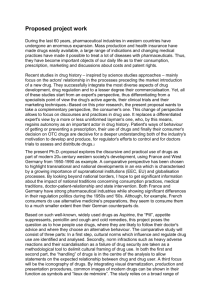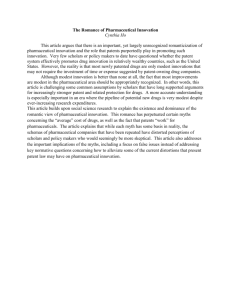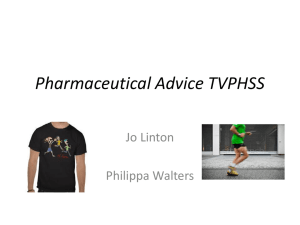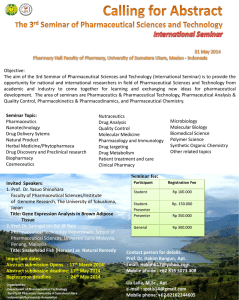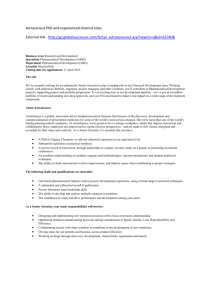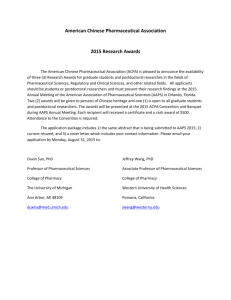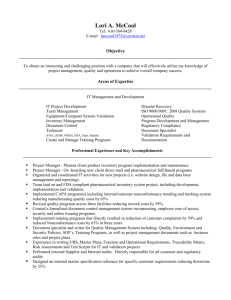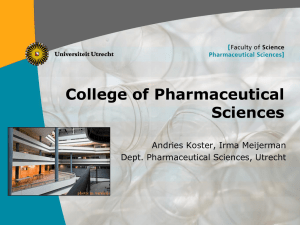MSc Pharmaceutical Enterprise Course description and module
advertisement
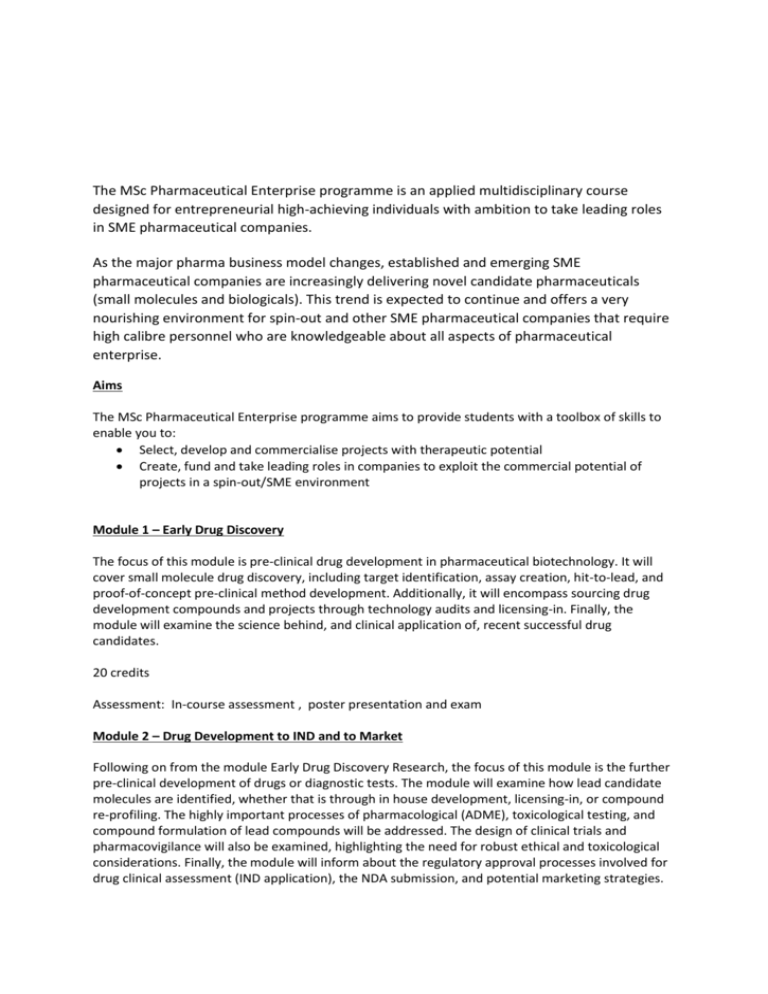
The MSc Pharmaceutical Enterprise programme is an applied multidisciplinary course designed for entrepreneurial high-achieving individuals with ambition to take leading roles in SME pharmaceutical companies. As the major pharma business model changes, established and emerging SME pharmaceutical companies are increasingly delivering novel candidate pharmaceuticals (small molecules and biologicals). This trend is expected to continue and offers a very nourishing environment for spin-out and other SME pharmaceutical companies that require high calibre personnel who are knowledgeable about all aspects of pharmaceutical enterprise. Aims The MSc Pharmaceutical Enterprise programme aims to provide students with a toolbox of skills to enable you to: Select, develop and commercialise projects with therapeutic potential Create, fund and take leading roles in companies to exploit the commercial potential of projects in a spin-out/SME environment Module 1 – Early Drug Discovery The focus of this module is pre-clinical drug development in pharmaceutical biotechnology. It will cover small molecule drug discovery, including target identification, assay creation, hit-to-lead, and proof-of-concept pre-clinical method development. Additionally, it will encompass sourcing drug development compounds and projects through technology audits and licensing-in. Finally, the module will examine the science behind, and clinical application of, recent successful drug candidates. 20 credits Assessment: In-course assessment , poster presentation and exam Module 2 – Drug Development to IND and to Market Following on from the module Early Drug Discovery Research, the focus of this module is the further pre-clinical development of drugs or diagnostic tests. The module will examine how lead candidate molecules are identified, whether that is through in house development, licensing-in, or compound re-profiling. The highly important processes of pharmacological (ADME), toxicological testing, and compound formulation of lead compounds will be addressed. The design of clinical trials and pharmacovigilance will also be examined, highlighting the need for robust ethical and toxicological considerations. Finally, the module will inform about the regulatory approval processes involved for drug clinical assessment (IND application), the NDA submission, and potential marketing strategies. 20 credits Assessment: Assignment, In-course assessment and presentation Module 3 – Drug IP Management & Commercialisation This module will focus on the importance of Intellectual Property (IP), and subsequent commercialisation of biotechnology, in the drug development process. This knowledge will be vital for students appreciation of how fledgling pharmaceutical companies control their drug portfolio; this also being critical in the further commercialisation and economic success of the company. Students will also examine and analyse current aspects of healthcare markets, leading to an understanding of how to value a drug/project/company in the prevailing economic climate. Students will investigate in detail the stage involved in creating spin-out companies, leading to the founding of small- to medium-sized enterprises (SME). Examples of how successful SMEs are managed, structured, and financed, will provide students with an in depth knowledge and critical awareness of how pharmaceutical companies expand and develop. 20 credits Assessment: Case report, presentation and exam Module 4 – Contract Research Organisations and Drug Development The focus of this module is to understand and critically appraise how Contract Research Organisations (CROs) interact with pharmaceutical companies. A CRO can be defined as a service organisation that provides support to the pharmaceutical and biotechnology industries in the form of research services outsourced on a contract basis. CROs warrants particular attention as a modern paradigm of the privatised biopharmaceutical sector. Therefore, this module will examine the importance of CROs in the globalisation and commercialisation of scientific research, highlighting their role in how science is becoming increasingly commercialised, and how this has affected the conduct of scientific research. The module will investigate the rapid rise of CROs since the early 1980’s and how this has impacted upon biopharmaceutical development. CROs have been integral to the innovation of many scientific areas, including the ethics behind the treatment of human subjects and the subjection of research tools to commercialisation. Furthermore, the global CRO market and consequent competition across organisations will also be critically examined. Students will analyse CRO technology, the research CRO’s pursue, and the legal and policy initiatives that CRO’s have fostered during their recently rapid rise. 10 credits Assessment: poster presentation and essay Module 5 – The Pharmaceutical SME: Corporate governance, legislation & finance The module provides the students with fundamental knowledge and practical skills concerning the establishing and maintenance of a pharmaceutical small or medium enterprise (SME) specifically covering the setting up of a company, corporate governance including the requirements of submissions to government authorities and the setting of budgets. 20 credits Assessment : essay Module 6 – Group Pharmaceutical Consultancy project The module provides the students with the opportunity to use the theoretical scientific and professional understanding they have developed through the proceeding taught components of the programme to analyse and address a real-world scientific and/or business question and to formulate justifiable recommendations (explicitly the question will not be ‘how to fund a business opportunity’ to avoid potential repetition of learning from the ‘Funding a Start-up Pharmaceutical Company’ module). The questions will be provided by relevant external business organisations and/or teaching staff. Examples of the types of questions include: What is the competitive landscape for drugs in development for the treatment of inflammation? Which contract research organisations offer a particular named assay and what are their strengths and weaknesses? 20 credits Assessment: group written report Module 7 – Funding a start-up pharmaceutical company The module provides the students with the opportunity to use the scientific and professional understanding they have developed through the proceeding taught component of the programme to create and develop a written and oral presentation business plan as if to pitch for venture capital funding. Delivery will be via SGT, roundtable-type discussions and ‘drop-in’ clinics. The students are expected to demonstrate novel thinking and application of knowledge to demonstrate the investment readiness of the proposition. 10 credits Assessment: group written report Module 8 – Dissertation (MSc only) The module provides the student with the opportunity to select (or propose) and develop their own specific project relevant to pharmaceutical enterprise. They will need to apply the scientific and professional understanding they have developed through the taught components of the programme to select an area of interest from a list of proposed project areas (arising from relevant areas of expertise within the UoB and associated external companies) or a project area generated by the student (subject to acceptance by the module lead). 60 credits Assessment; 10,000 word research project and presentation
